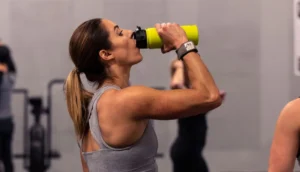Creatine is one of the most researched and widely used supplements in the world of fitness. While it has gained immense popularity among male athletes and bodybuilders, more and more women are now turning to creatine to help boost their performance, endurance, and muscle tone. But how does creatine affect women specifically, and are the benefits similar to those experienced by men? In this article, we’ll explore the creatine effect on women, bust some common myths, and provide guidance on how women can safely and effectively use creatine to reach their fitness goals.
What is Creatine?
Creatine is a naturally occurring compound found in small amounts in certain foods like meat and fish and is produced by the body in the liver, kidneys, and pancreas. It plays a critical role in the production of energy, particularly during high-intensity exercise. Creatine helps regenerate adenosine triphosphate (ATP), the body’s main source of energy, which allows you to push harder in your workouts.
For athletes, bodybuilders, and fitness enthusiasts, supplementing with creatine can increase the amount of available energy in muscles, leading to better performance, improved strength, and faster recovery times. Although creatine has been historically marketed towards men, women can also experience significant benefits from its use, which we’ll explore in detail below.
Common Misconceptions about Creatine for Women
There are several myths surrounding creatine usage, especially when it comes to women. Here are some of the most common misconceptions:
Myth 1: Creatine makes women bulky.
One of the biggest fears women have when considering creatine is that it will cause them to gain excessive muscle mass or make them appear bulky. In reality, creatine helps with muscle hydration and enhances energy, which can lead to increased muscle strength and definition—not bulk. Women generally do not produce the same levels of testosterone as men, which is why “bulking up” isn’t a likely result of taking creatine.
Myth 2: Creatine causes water retention and bloating.
Another common concern is that creatine leads to bloating or water retention. While creatine does draw water into the muscles, this is actually a positive effect. The increased water content in muscle cells helps improve performance and muscle recovery, rather than leading to noticeable bloating. Any slight weight gain due to water retention is typically within the muscles and not a result of fluid buildup elsewhere in the body.
Myth 3: Creatine is only for men or bodybuilders.
Creatine has long been associated with male bodybuilders or strength athletes, but its benefits extend far beyond that demographic. Women, whether they’re lifting weights, engaging in high-intensity interval training (HIIT), or participating in endurance sports, can all benefit from creatine supplementation. Its ability to boost energy and improve recovery makes it a valuable tool for any woman looking to enhance her fitness level.
How Creatine Affects Women’s Bodies
Creatine can be just as effective for women as it is for men, with a few notable effects on the body:
- Muscle Growth and Strength: Creatine boosts the body’s ability to produce energy during high-intensity workouts, allowing for more efficient and powerful muscle contractions. This results in greater muscle strength and endurance over time, without adding bulk.
- Energy Production: Creatine helps increase phosphocreatine stores in muscles, providing rapid energy bursts during intense exercise. This is particularly beneficial for activities like weightlifting, sprinting, and HIIT workouts.
- Increased Endurance: Women who engage in activities that require short bursts of energy, such as sprints or high-intensity circuits, may notice an improvement in stamina and endurance due to creatine’s ability to increase available energy.
Creatine and Female Hormones
One of the common concerns women have when considering creatine supplementation is whether it affects hormones, particularly estrogen and testosterone. However, studies have shown that creatine effects on women do not include significant changes in hormone levels. Creatine works by increasing energy production at the cellular level without impacting the hormonal balance. This makes it a safe and effective supplement for women without any concerns about disrupting hormonal cycles or causing unwanted hormonal side effects.
As for the menstrual cycle, there’s no substantial evidence to suggest that creatine negatively affects it. Women can use creatine during any phase of their cycle without worrying about adverse effects on their body’s natural processes.
Benefits of Creatine for Women
The creatine effect on women provides a range of benefits beyond just muscle growth and athletic performance. Here are some of the key advantages that women can experience from creatine supplementation:
Improved Athletic Performance
Creatine is especially helpful for women engaging in high-intensity workouts. Whether it’s lifting weights, sprinting, or performing explosive movements in HIIT workouts, creatine helps provide that extra energy needed to push harder and go further. Many women report increased strength and endurance, which leads to improved performance in both gym settings and athletic competitions.
Enhanced Muscle Tone Without Bulk
One of the most desirable creatine effects on women is the enhancement of muscle tone without excessive bulk. Women naturally build lean muscle mass, and creatine helps amplify that process by increasing muscle hydration and energy availability. This means stronger, more defined muscles that look toned and athletic, without the fear of becoming overly muscular.
Brain Health and Cognitive Function
Beyond physical benefits, recent research has suggested that creatine may have a positive impact on brain health. Studies have shown that creatine supplementation can improve cognitive function, memory, and focus, especially in periods of mental fatigue or stress. This makes it a great supplement not only for women looking to improve their physical performance but also for those seeking better mental clarity and focus.
Creatine Side Effects in Women: What You Need to Know
While creatine is generally considered safe, it’s important to understand some of the potential side effects and how they may manifest in women. The most commonly reported side effect of creatine is temporary water retention. This occurs because creatine draws water into the muscles, but as previously mentioned, this is not harmful and often leads to a fuller, more toned appearance in muscles. Any slight weight gain due to this water retention is usually limited to muscle tissue and should not cause concern.
Addressing the Fear of Weight Gain
Many women worry about gaining weight when taking creatine. It’s essential to note that any initial weight gain is not fat but water being stored in the muscles, which can make them look fuller and more defined. Over time, as your body adjusts to creatine supplementation, this water retention stabilizes, and you can continue to enjoy the benefits of increased strength, endurance, and muscle recovery without further weight fluctuations.
Long-Term Use of Creatine in Women
When considering the long-term creatine effects on women, it’s important to note that creatine is one of the most extensively researched supplements available. Long-term studies have shown that creatine is safe when used correctly, even for extended periods. Women who take creatine consistently can experience sustained improvements in muscle performance, energy levels, and recovery without any major health concerns.
One issue often discussed is the potential impact of creatine on kidney health. While creatine can slightly increase creatinine levels (a marker used to assess kidney function), research has consistently found that creatine does not cause kidney damage in healthy individuals. For women without pre-existing kidney issues, creatine is considered safe for long-term use, provided they stay hydrated and follow recommended dosages.
Creatine Effects on Women’s Bone Health
One less-discussed but important creatine effect on women is its potential role in supporting bone health. As women age, they are at an increased risk of osteoporosis, especially after menopause. While creatine is primarily known for enhancing muscle mass and strength, some research suggests that increased muscle activity and strength may have a protective effect on bone density. By improving muscle mass, creatine can indirectly help women strengthen their bones, reducing the risk of fractures and bone-related injuries in the long run.
Studies are ongoing, but the creatine effect on women in relation to bone health is becoming an area of growing interest, particularly for older women and those who are active in strength training. This added benefit makes creatine a valuable supplement for women who want to support not only their fitness goals but also their overall skeletal health.
Best Practices for Women Taking Creatine
For women to maximize the creatine effect on women, it’s essential to follow best practices regarding dosage and timing. Here’s how women can effectively incorporate creatine into their routines:
- Dosage: Most experts recommend women start with 3-5 grams of creatine per day. There is no need for a “loading phase” (taking higher doses at the start) unless rapid results are desired. A consistent daily dose is effective for building creatine stores over time.
- Timing: The timing of creatine intake is flexible, but many women find that taking it post-workout helps with muscle recovery. Others prefer to take it before workouts to ensure optimal energy levels. Ultimately, what matters most is taking it consistently, as the benefits accumulate over time.
- Hydration: Creatine draws water into the muscles, so staying well-hydrated is crucial. Women should aim to drink plenty of water throughout the day, especially when taking creatine, to avoid dehydration and optimize performance.
Should Women Cycle Creatine?
Cycling creatine, or periodically stopping and starting supplementation, is a common practice among some users. However, there is no scientific evidence suggesting that women need to cycle creatine. For most women, taking creatine consistently, without breaks, leads to sustained benefits in performance, recovery, and muscle tone. That said, if women feel the need to take a break from creatine for personal reasons, it’s perfectly fine to stop and restart when ready. The creatine effect on women will resume once supplementation is continued.
Creatine and Weight Loss: Does It Help Women?
One question frequently asked is whether creatine can assist with weight loss. While creatine itself does not directly promote fat loss, it can play an important role in maintaining lean muscle mass while women are in a calorie deficit. Retaining muscle mass is critical for metabolism, as muscles burn more calories than fat. By preserving muscle, creatine helps women maintain their metabolic rate, which can support fat loss over time.
Additionally, since creatine increases energy levels and endurance, women may find themselves able to perform more intense workouts, which can lead to greater calorie burn. The creatine effect on women during weight loss is primarily about ensuring they can maintain muscle mass and performance, even in a calorie-restricted diet.
Creatine Effect on Women in Endurance Sports
Although creatine is often associated with short bursts of high-intensity activity, many endurance athletes have also started to recognize its benefits. For women in endurance sports, the creatine effect on women can be seen in improved performance during short, intense periods of activity, such as sprints or uphill runs. These activities require quick bursts of energy, and creatine can help replenish energy stores rapidly, allowing endurance athletes to push through fatigue.
Additionally, the creatine effect on women involved in endurance sports can also lead to better muscle recovery, reducing soreness after long training sessions. While creatine won’t directly improve long-duration stamina, its ability to support muscle recovery and energy production during high-effort portions of a race or workout makes it a helpful tool for women training in endurance disciplines.
Choosing the Right Creatine Supplement for Women
When it comes to selecting the best creatine supplement, creatine monohydrate is widely regarded as the most effective and affordable option. Other forms, such as creatine hydrochloride (HCL) or creatine ethyl ester, may offer slight differences in absorption, but they are often more expensive without providing significant added benefits.
Women should look for pure creatine monohydrate supplements, as they are well-researched, cost-effective, and deliver the best creatine effects on women. It’s also important to choose supplements from reputable brands to ensure product purity and quality.
Real-Life Experiences: How Creatine Helped Women Achieve Their Fitness Goals
Countless women have shared success stories of how creatine has transformed their fitness journeys. From increased strength to improved recovery times, the creatine effect on women is consistently positive across different fitness levels and goals. Many women report feeling more energized during workouts, recovering faster from intense sessions, and achieving a leaner, more toned physique with regular creatine use.
Whether training for a marathon, aiming for a personal best in the gym, or simply trying to maintain muscle during weight loss, creatine has become a trusted supplement for many women looking to enhance their physical performance and overall well-being.
Frequently Asked Questions about Creatine for Women
Does creatine cause bloating in women?
Some women may experience temporary water retention when first starting creatine, as it draws water into the muscles. However, this effect typically subsides, and the water retention is mostly within the muscle tissue, not under the skin. It helps improve muscle performance without leading to excessive bloating.
Can women take creatine without working out?
Although it is safe for women to take creatine without exercising, the benefits are significantly reduced. Creatine is most effective when paired with physical activity, particularly strength training or high-intensity workouts, as it helps boost performance and recovery.
Is creatine safe for older women?
Yes, creatine is safe for older women and can offer additional benefits, such as improved muscle mass, better strength, and enhanced cognitive function. Older women can benefit from creatine as it helps combat the natural loss of muscle mass and strength that occurs with age.
Do women need to load creatine?
The “loading phase” of creatine, where higher doses are taken in the first few days, isn’t necessary. Women can simply start with a regular dose of 3-5 grams per day and experience the same benefits over time without the need for loading.
Can creatine help with toning rather than bulking?
Yes! Creatine helps women build lean muscle mass, enhancing muscle tone without leading to bulk. Women do not have the same hormonal profile as men, so creatine supports a toned, athletic look rather than excessive muscle gain.
Conclusion
Creatine offers a range of benefits for women, from increased strength and energy to better muscle recovery and improved performance. Despite common misconceptions, creatine does not lead to bulk or significant weight gain in women. Instead, it supports lean muscle growth, boosts endurance, and even has potential cognitive benefits. When used correctly, creatine can be a powerful tool for women looking to enhance their fitness, strength, and overall health.
Whether your goal is improved athletic performance, maintaining muscle during weight loss, or just getting the most out of your workouts, creatine is a well-researched and safe supplement for women of all fitness levels. As with any supplement, it’s essential to stay hydrated and use it consistently for the best results.
5 Additional FAQs
- Does creatine affect women’s mood or emotions?
- No, creatine does not typically affect mood or emotions. It primarily impacts muscle performance and energy production without altering mood-regulating hormones.
- How long does it take to see results from creatine?
- Most women start noticing improvements in energy and performance within the first few weeks of consistent creatine use, while more significant muscle gains can take longer.
- Can vegetarians or vegans benefit from creatine?
- Absolutely! Since creatine is primarily found in meat and fish, vegetarians and vegans often have lower natural creatine stores and can benefit greatly from supplementation.
- Can creatine help with endurance sports like running?
- Yes, creatine can improve short bursts of energy in activities like sprints or interval training. While it’s not a direct endurance booster, it can enhance high-intensity phases of endurance training.
- Should women avoid creatine during pregnancy?
- While there’s limited research on creatine use during pregnancy, it’s best to consult a healthcare provider before taking any supplements during this period.









